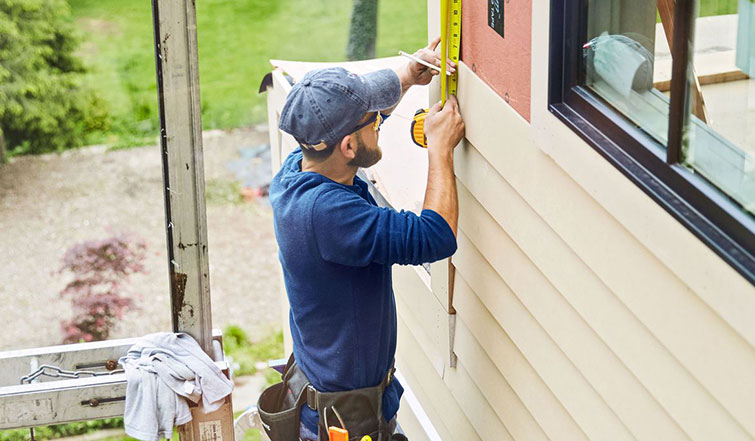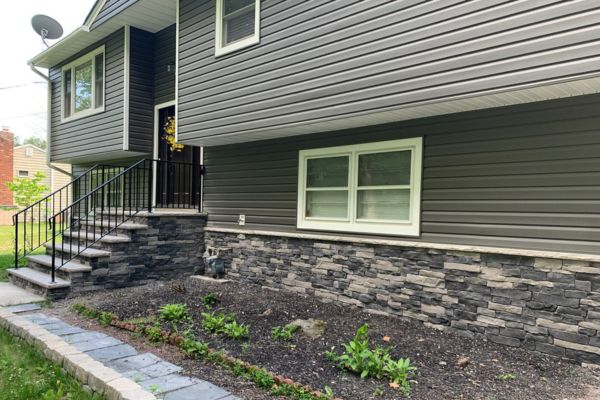Morris Siding Contractor Committed to Excellence in Every Project
Morris Siding Contractor Committed to Excellence in Every Project
Blog Article
The Crucial Guide to the Various Kinds Of House Siding and Their Distinct Advantages
In the realm of home improvement, selecting the ideal house siding is an essential choice that impacts both aesthetic charm and useful performance. With so several options to take into consideration, which home siding material really stands out for your certain task?
Wood Exterior Siding
Wood home siding, a popular option for household outsides, offers an ageless aesthetic that incorporates all-natural appeal with structural honesty. This house siding material is offered in numerous styles, consisting of clapboard, roof shingles, and board-and-batten, enabling property owners to customize their façade to match their style choices. Wood home siding is generally crafted from durable types such as cedar, redwood, or want, which are understood for their strength and ability to stand up to environmental stressors.
Among the key benefits of timber home siding is its exceptional insulation residential properties, which can add to energy effectiveness and lower heating prices. In addition, timber siding is eco-friendly, making it an eco pleasant choice when sourced sustainably. Normal upkeep, including paint or discoloration, can extend its life expectancy and boost its look, allowing homeowners to maintain the natural appeal of the timber.
However, prospective disadvantages include vulnerability to parasites, rot, and weather condition damage, requiring appropriate therapy and maintenance - morris siding contractor. Regardless of these concerns, when correctly cared for, wood house siding can offer a long lasting and gorgeous option that improves the personality of a home while supplying a cozy, inviting environment

Vinyl Siding
Plastic home siding has actually arised as a leading choice for home owners seeking a low-maintenance outside option that integrates longevity and price. This flexible material is crafted from polyvinyl chloride (PVC), making it resistant to different weather condition problems, including wetness and UV rays. Therefore, plastic siding does not warp, rot, or discolor, making sure durable aesthetic appeal.
Among the key benefits of vinyl home siding is its comprehensive variety of colors and styles, permitting property owners to attain the desired seek their residential property without the requirement for constant repainting. Furthermore, plastic house siding is simple to install, which can dramatically lower labor costs throughout building and construction or renovation jobs.
Plastic home siding additionally adds to energy efficiency. Several choices feature insulation support, which improves thermal performance, aiding to keep comfortable interior temperature levels and possibly decreasing power expenses. In addition, its smooth surface area promotes very easy cleansing, calling for just regular washing with a yard hose to get rid of dust and particles.
Fiber Cement House Siding
Fiber cement exterior siding has gained traction amongst property owners and home builders alike due to its exceptional combination of sturdiness and visual convenience. Made up of a mix of cellulose, cement, and sand fibers, this exterior siding choice is engineered to stand up to extreme climate condition, including high winds, hefty rainfall, and temperature fluctuations, making it a resilient option for domestic exteriors.

Among the key advantages of fiber cement house siding is its resistance to insects, such as termites, and its non-combustible nature, offering improved fire security. morris siding contractor. Additionally, it is readily available in a vast range of structures, designs, and colors, allowing homeowners to attain their wanted visual without sacrificing efficiency
One more advantage is its low maintenance demands; fiber published here cement exterior siding usually requires paint or staining every 5-10 years, which is much less constant than other materials. Moreover, its long life contributes to a lower overall cost of possession, as it reduces the need for constant repairs or replacements.
Eventually, fiber cement house siding represents an outstanding financial investment for those looking for a resistant, eye-catching, and flexible outside option, incorporating both type and feature to enhance the home's visual charm.
Steel Home Siding
The allure of metal exterior siding lies in its robust durability and modern-day aesthetic appeal, making it a popular choice for contemporary design. Available in products such as aluminum and steel, metal exterior siding supplies a range of finishes and shades, enabling homeowners to attain a tailored appearance that matches their layout vision.

Power effectiveness is one more significant benefit, as many steel home siding items are developed with insulation alternatives that help manage indoor temperature levels. This can result in minimized power prices in time. Furthermore, steel home siding is commonly recyclable, making it an eco-friendly option for sustainability-minded homeowners.
The installment procedure for metal siding can be fairly straightforward, leading to a quicker turn-around time for building and construction jobs. Generally, metal home siding incorporates capability and design, making it a sensible option for those looking for a long-lasting and aesthetically attractive exterior finish.
Block and Stone Home Siding
Block and rock exterior siding stands out as a timeless option that enhances the visual appeal of any home. Recognized for their resilience and low upkeep, these products provide an extraordinary roi while raising the property's aesthetic appeal. Readily available in different shades, structures, and patterns, block and stone click to read more can be tailored to match varied architectural styles, from traditional to modern-day.
One of the key benefits of block and rock exterior siding is their power effectiveness. Both materials possess natural protecting residential properties that aid regulate indoor temperature levels, potentially decreasing home heating and air conditioning prices. Additionally, they provide remarkable fire resistance compared to various other house siding options, adding to enhanced security.
One more benefit is their durability. Block and stone can last for years, often calling for very little maintenance beyond periodic cleansing. Unlike wood house siding, they are unsusceptible pests and rot, making sure a resilient outside that withstands the components.
Conclusion
In summary, the selection of Full Report house siding substantially affects a home's aesthetic appeal, energy performance, and maintenance needs. Each kind of siding-- whether wood, vinyl, fiber cement, block, or steel and stone-- offers special advantages customized to numerous house owner preferences and ecological conditions. Recognizing these choices allows informed decisions that boost both the sturdiness and aesthetic charm of domestic exteriors. Inevitably, selecting the best exterior siding is important for accomplishing an equilibrium between performance and layout in household design.
One of the primary advantages of timber home siding is its excellent insulation residential or commercial properties, which can contribute to power efficiency and lower home heating expenses. Additionally, timber siding is eco-friendly, making it an ecologically friendly alternative when sourced sustainably.One of the main advantages of steel siding is its resistance to numerous environmental elements.Power efficiency is one more considerable benefit, as many steel home siding items are developed with insulation options that aid regulate interior temperatures. Each kind of home siding-- whether timber, vinyl, fiber metal, cement, or brick and stone-- provides special advantages customized to numerous home owner choices and ecological problems.
Report this page